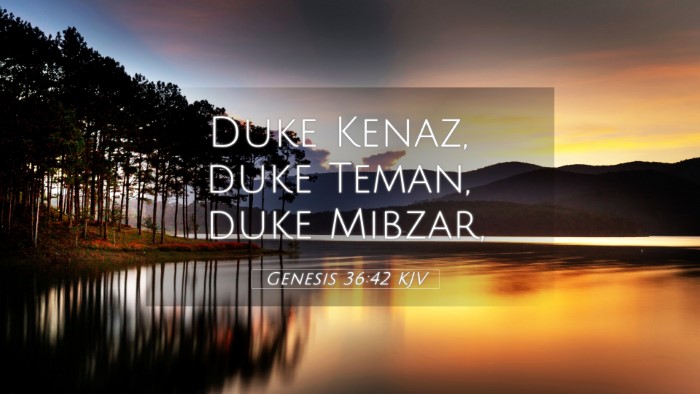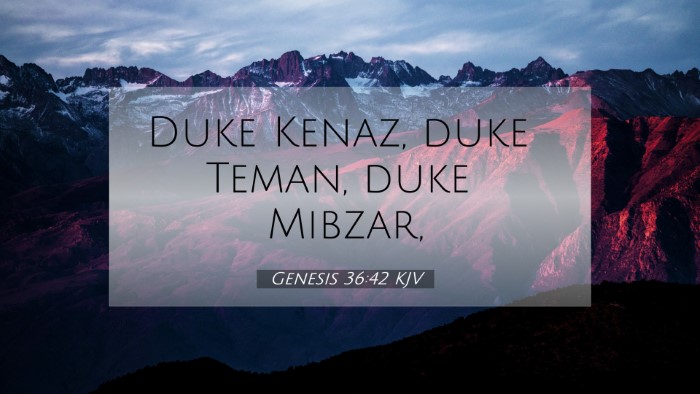Genesis 36:42 - Meaning and Interpretation
Genesis 36:42 reads: "And Jobab the son of Zerah of Bozrah reigned in his stead." This verse marks a significant moment in the genealogy and history of the Edomites, offering a glimpse into the lineage of Esau and the subsequent rulers that emerged from his descendants.
Overview
The purpose of this verse in the broader narrative of Genesis serves to establish the succession of kings who ruled over Edom, a nation descended from Esau, Jacob’s brother. Understanding the lineage helps one appreciate the larger historical and theological themes present in the Bible.
Insights from Public Domain Commentaries
Matthew Henry’s Commentary
Matthew Henry emphasizes the importance of recognizing the fulfillment of God's promise to Esau in producing a lineage that would be significant in biblical history. The mention of Jobab suggests God’s providence in maintaining order among the descendants of Esau.
Albert Barnes’ Notes
Albert Barnes points out that the specifics of Jobab's reign—such as his origin in Bozrah—underscore the tribal characteristics of the Edomites. Bozrah itself represents a place of strength and significance within the Edomite territory. Barnes connects this to the broader context of how geographical locations often played a critical role in the history of Israel's neighbors.
Adam Clarke’s Commentary
Adam Clarke adds that the name Jobab signifies "to return" which is suggestive in the context of the Edomite people and their sometimes tumultuous history. He reflects on the continuity of kings in Edom and the implications of leadership derived from such genealogies. Clarke asserts that the mention of leadership reflects both the political and spiritual condition of the people.
Connections to Other Scriptures
This passage in Genesis 36:42 can be explored through various cross-references, which enhance our understanding of its meaning:
- Genesis 25:30: Exploration of Esau's lineage.
- 1 Chronicles 1:43-54: A genealogical record of the Edomites.
- Amos 1:12: Prophetic references to Edom's fate.
- Obadiah 1:21: Esau's descendants and their ultimate downfall.
- Numbers 20:14-21: Israel's interaction with Edom.
- Malachi 1:3: The prophecy regarding Edom and God's love for Jacob.
- Deuteronomy 2:4-5: Guidelines for dealing with the descendants of Esau.
Thematic Connections
The themes surrounding Genesis 36:42 revolve around:
- Leadership: Insight into how leadership descends through generations.
- Heritage: The significance of ancestry in the biblical narrative.
- Divine Providence: God's hand in the establishment of nations.
- Fulfillment of Promises: How God maintains His word throughout generations.
Understanding Through Cross-Referencing
By utilizing tools for Bible cross-referencing, one can gain deeper insights into Genesis 36:42 and its context. The connections between biblical texts reveal patterns and themes essential for theological study, enhancing the coherence of scripture as a whole.
Conclusion
Genesis 36:42 serves as more than a historical entry; it is a testament to God's engagement with humanity throughout time. In understanding this verse and its connections, one can appreciate the complexity of biblical lineage and the intricacies of God's covenant promises.
Further Exploration
For those interested in deeper study, consider the following:
- How to find cross-references in the Bible.
- Identifying connections between Old and New Testament writings.
- Exploring themes of leadership and heritage in scripture.
- Cross-referencing Psalms with New Testament teachings.
Through these explorations, readers can further understand the intricate web of biblical narratives and themes, enriching their study and interpretation of the Holy Scriptures.


